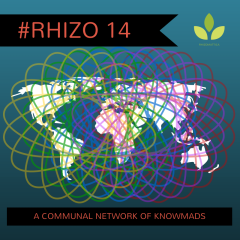
rhizo47
sensory experience: wanna try? Listen to this while reading
I see rhizomes everywhere
Last friday I conducted a routine test validation session with a group of twenty teachers. Although the ultimate purpose of meetings such as this one is to calibrate and make adjustments to a specific assessment instrument, it is also a precious opportunity to tap into the collective knowledge and experiences that those teachers are having in their piloting experiences using recently adopted course books. This was the second time I tried out a specific set of group dynamics in which small clusters of 4 to 5 people engage with the instrument being assessed and with each other. Once those nodes were all set, we were off. As we progressed in the assessment of the instrument, relevant connections began to sprang up in conversation about pertinent classroom situations, activities, approaches to a given subject/skill, and as we seized these opportunitites to ask questions, discuss issues, share difficulties, our co-constructed space seemed to be teeming with dense connection. Never before had I found myself answering so many questions with… questions… The silences that followed some of those, along with the intensity of their engagement with the instrument and each other, first within their smaller, more intimate networks, and then with the larger network, the community of teachers. Ideas abound in a free flow, it was all happening. And all I had been doing was answering questions with more questions.

rhizowall
On Power & Force
As a supervisor I am regarded as a leader, and with leadership comes responsibility and power. Which reminds me of the considerations Keith Hammon made in our last (and brilliant) #rhizo14 unhangout regarding the power play in human relations.
“I don’t know a way to engage with other people without engaging in power. I do distinguish between power and force. (…) what I mean force is… I have a small gravitational pull which will, in your presence, act upon you however slightly. Power is different in that it seems to imply some sort of intention, or some sort of decision on the part of the person exercising it. The power issue is as problematic for me as it appears to be for Clarissa, but I don’t know how to do away with it (…) and my only take is to recognize that everyone has power.”
I really might have been experimenting with the <power> <force> interface that day with my fellow teachers. My force being perceived in the mediation of interactions among the networks and, in specific moments, the exertion of power might have been more concrete when a decision had to me made, for example in my decision of reallocating a specific amount of points from one section to the other, but decisions which were, nonetheless, informed by the force of the individuals who were there, sharing that space with me, sometimes kicking the ball to a secret corner, one which had never been openly spoken of/reflected upon. Experts on tap.
Unrehearsed obsolescence
So many were the moments during that gathering in which my role as supervisor faded in the background. I answered questions with other questions also because I didn’t have the answers, and I came clean about it. (I’ll remix Dave’s words in our unhangout now.) > So much a part of performing the role of supervisor/teacher properly is to be honest and emotional about what you’re doing. It really might be that the way you make it work is by coming clean about your own vulnerabilities, candidly admitting your own uncertainties. Could that be the untold secret about leveraging the power play to create a space of equality?
And since I feel like exercising with my newly acquired literacy of remix, I’ll mash in some of Keith’s thoughts on obsolescence. I might be looking to make my supervisor/teacher role obsolete, which doesn’t mean that I want to make me obsolete. I don’t want to be above, and nor do I want to be left behind. I wanna be in equal footing with others, my students and my teachers. How else could I achieve that if not by becoming a co-learner and a co-constructor? As Keith so clearly put it
“I appreciate the fact that you (Dave) were able to share power (in #rhizo14), and maybe that’s another strategy for dealing with power. You can’t do away with power, but you can share it. And if you share it intelligently and sympathetically, maybe you’ve done the best you can do in handling power.”
What does it mean to ‘end’ an experience in rhizomatic learning?
I confessed to my fellow rhizoers that the rhizo journey has been, for me, a journey of deconstruction. In so many ways the rizhome has been creeping up all over me. In so many ways I have been unable to find the words that encapsulate bits of that experience. Little did I know at the time I had you locked on my radar that I had been about to embark in the deepest, densest, most significant learning experience I have ever had to this day. The rhizome did find an awful lot of fertile ground in me, at this time of my life – this, and not before, not after, not even by a day.
This is not a rhizo farewell post, even though I have been awkwardly postponing it in an attempt to un-end, suspend.
Having said that, I also feel the urge of declaring my absolute admiration and gratefulness to all of you rhizoers out there who have been pouring out your hearts, and sharing the works of your brilliant minds. What a privilege it has been.
Let us rhizo on together. > #rhizo15

rhizofrontporch
rhizoidimagery> all of the photos are of my street (1st photo) and my home (2nd and 3rd) .. you’re welcome






